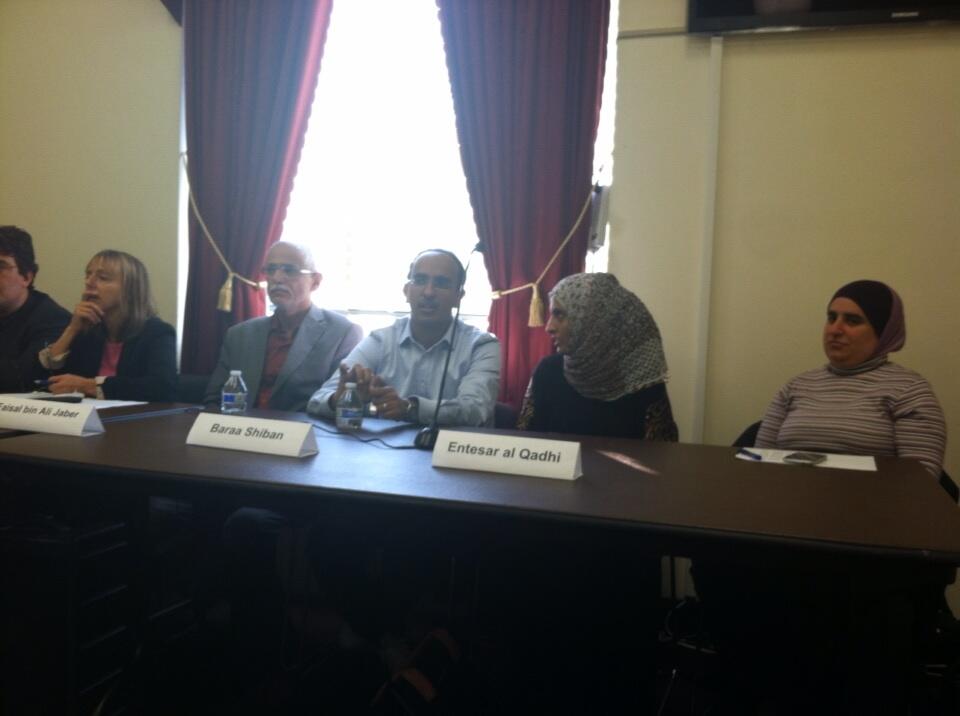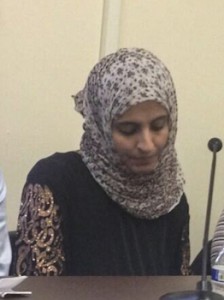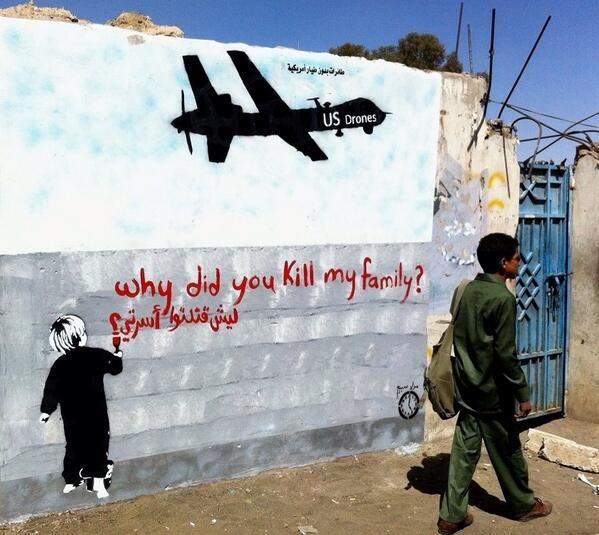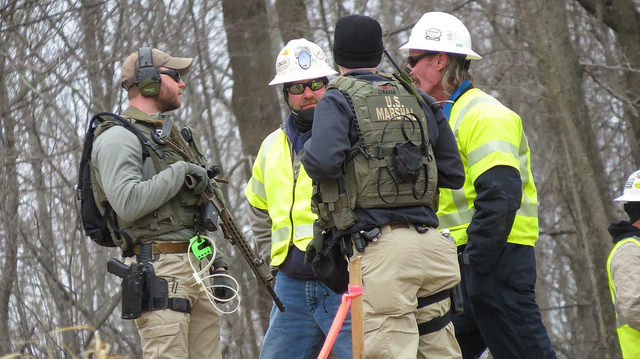The room in Rayburn House Office Building was packed to overflowing. An older, dignified but sad man sitting at the table at the front of the room said through an interpreter:
“I came here to share with you my story and what happened to my family. Who are the ones responsible for the deaths of my relatives? Will anyone be held accountable for their deaths?”
Rep. Alan Grayson (D-FL) had called a Congressional briefing on U.S. drone strikes. Faisal bin Ali Jaber, the man who was there on behalf of his slain relatives, had just learned that his home province of Hadramawt was again attacked by drones that very day. He was one of three people from Yemen who were there to talk about the effect that drone strikes were having on their country. Their stories repeatedly returned to themes of fear, accountability and counterproductive results.

Five members of Congress–Reps. Alan Grayson, Jan Schakowsky (D-IL), Charlie Rangel (D-NY), Barbara Lee (D-CA) and Chellie Pingree (D-ME)–heard testimony from the Yemeni delegation–Faisal Ali Jaber, Entsar al Qadhi, and Baraa Shiban–as well as two experts on drone warfare in the Mideast, Medea Benjamin of peace organization CODEPINK and Robert Naiman of Just Foreign Policy.
The members of Congress who attended came seeking information, because, as it became apparent during the hearing, they can’t get it from the government. Paradoxically, the program is still officially classified.
“It’s conducted by the CIA, which generally doesn’t acknowledge existence of this program,” said Rep. Grayson about the secrecy. “It’s like a strange and extreme police action. There’s a reluctance on the part of the administration to acknowledge that attacks are happening at all.”
Still, Congress seems content to remain in the dark. This was only the second hearing on drone strikes since they began ten years ago. The first occurred only a few weeks prior on October 30. Only five Congressmen and women showed up at that one too.
In 2012, a U.S. drone strike killed Ali Jaber’s brother-in-law–an outspoken anti-al Qaeda cleric–and nephew just a day after the wedding of Faisal’s son. “I cannot explain how horrific the scene was. There are no words to explain how horrific it is when you see an arm thrown somewhere and leg thrown another place,” Ali Jaber said.
“People are still living in fear from fact that drones are still hovering over villages… In August another strike happened and killed my friend’s son,” Ali Jaber continued. “The fact that there was another drone strike in my area today makes me afraid that there are other victims and more people in the future Obama will have to answer to.”

Entesar al Qadhi, a member of the National Dialogue Conference, described the same anxiety in her native Mareb, a province routinely targeted by drone strikes. She said that drones hover over villages for four days before attacking, causing everyone to live in fear.
“Most victims are not from our village,” she said quietly but firmly through an interpreter. “Just because they are passing by makes the village a target. What can possibly justify terrorizing a community of 250,000 just for the purpose of killing one person? It might be the right of the U.S. to protect itself, but that doesn’t mean it can terrorize entire communities.”
She emphasized that the people from her region were absolutely against terrorism, that they had in fact made treaties with the government to turn over those suspected of being militants. But, she contended, drone strikes were having the opposite of their intended effect. The U.S. wasn’t destroying al Qaeda but recruiting more terrorists.
“These strikes actually make al Qaeda people more popular. My entire purpose today is to tell American people: don’t help al Qaeda with drone strikes, which make al Qaeda more popular,” she said.
Referring to the bombing that killed his relatives, Ali Jaber said, “The four missiles did exactly what al Qaeda does–kill people without any legal justification for it.”
Baraa Shiban, also a member of the National Dialogue Conference and Yemen project coordinator for legal group Reprieve, said that before 2011, estimates put the number of militants at 300, but since then it has increased to 3,000. “Yemenis often say, “We are not afraid of al Qaeda, we’re afraid of U.S. drone strikes,'” he said.
Rep. Grayson agreed that drones are aggravating terrorism, not alleviating it. “We’ve inflamed public opinion around the world,” he said. “We create 50-60 more terrorists with each drone strike.”
The U.S. government says that they are targeting top leaders of al Qaeda and that civilian casualties are rare. Ali Jaber was adamant that accountability was absolutely necessary. “Obama hasn’t responded to my letter [that I sent him this summer] nor apologized for drone strikes… Is the U.S. willing to give any compensation to families?”
Compensation, said Medea Benjamin, is “not really about money, but acknowledging a mistake.”
Shiban agreed. “Compensation is recognition that families have lost a member.”
Rep. Barbara Lee has introduced the Drones Accountability Act (HR 2183) to place a moratorium on the use of drones “until all legal mechanism are in place” and to repeal the 2001 AUMF (Authorization of Military Force).
Robert Naiman, Policy Director of Just Foreign Policy, suggested that the House Intelligence Committee should introduce legislation to force the Obama administration to disclose civilian casualties from drone attacks. Congress could also establish a compensation fund.
Ali Jaber, al Qadhi and Shiban appealed to Congress to stop drone attacks on their country, but their plea ultimately is to Americans. “The people who can take drones out of skies are the people here in America,” said Shiban.





